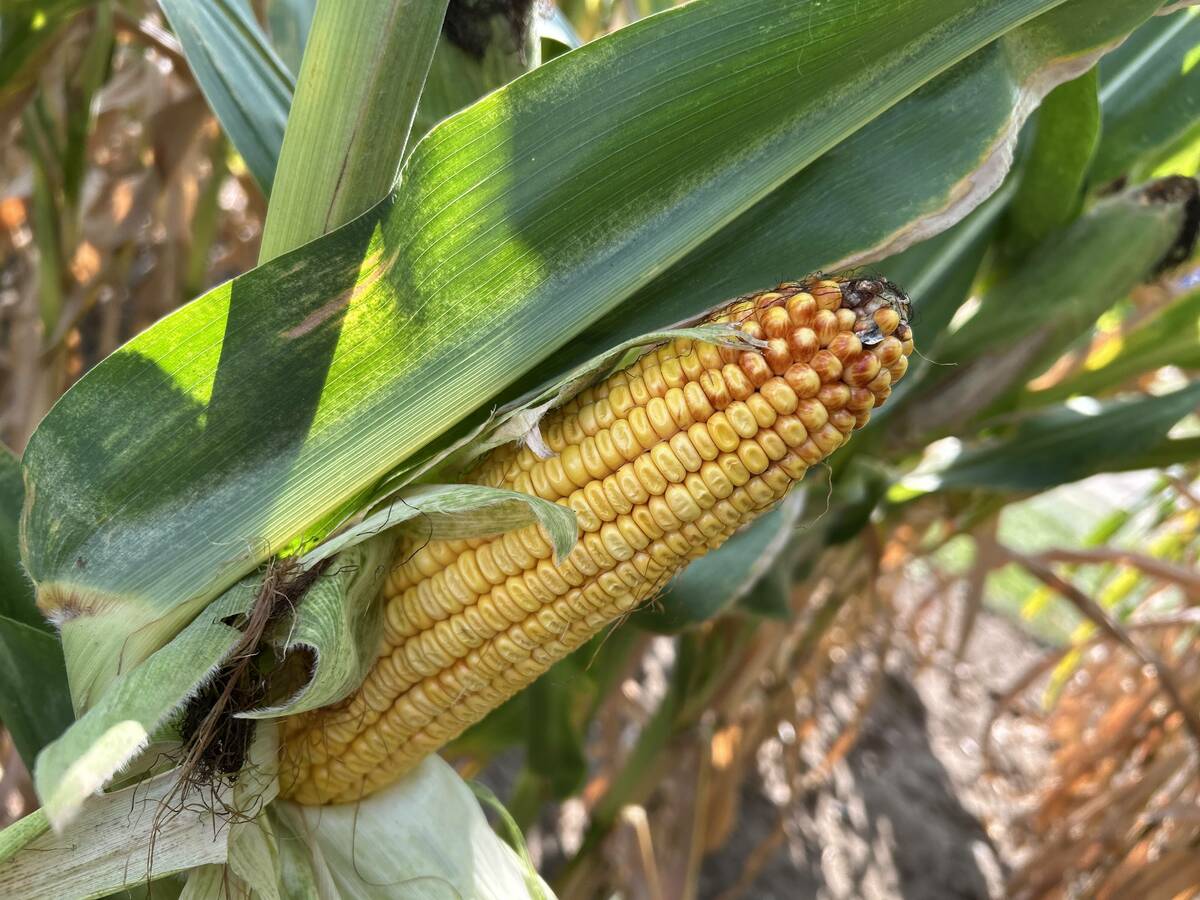Dismay lacking
I was mildly amused by the comments of Kevin Bender, president of the Western Canadian Wheat Growers Association, regarding the Canadian Wheat Board using farmers’ money to promote itself (Open Forum, March 11.)
Mr. Bender stated: “I’m sure most farmers and most Canadians would agree that in a democracy, citizens should not be compelled to financially support political causes against their will”.
Strangely enough, one would have thought he would have also ex-pressed his dismay toward the five Conservative members of Parliament who sent out information supporting certain candidates in the 2008 CWB director elections, using MP letterhead, with all costs paid for by the taxpayers.
Read Also

Crop estimates show mixed results
Model-based estimates used by Statistics Canada showed the 2025/26 crop year has seen increases in canola, corn for grain, oats and lentils production while seeing dips in spring wheat, durum wheat, soybeans and barley in comparison to 2024/25.
Perhaps it’s still coming.
Robert Ponto,
Galahad, Alta.
Playing footsie?
I was shocked by Laurent Pellerin’s comments that the Canadian Federation of Agriculture wants to “collaborate” with Ottawa.
Come on. (Federal agriculture minister) Gerry Ritz and the Harper Conservatives disrespect farmers and are doing nothing to improve agriculture in this country.
Gerry continues to do his best to wreck the CWB even though it belongs to the farmers and the majority believe in a single desk seller for wheat and barley.
The government has done nothing for cattlemen across this country, while hundreds of cattle herds are sold out.
The hog support program is a sham. Smoke and mirrors, no real help and the only thing happening with farm support programs is talk.
Gerry knows the programs are ineffective and do not really address the issue of farm income.
Where’s the costing review of the railways who continue to rape farmers in freight costs and have overcharged rate costs for years?
I say let’s bring the tractors and farmers out at MP constituency offices and on the Hill in Ottawa. Let’s bring back the rallies and the protests. Look at the European experience.
I am shocked by Laurent. I thought the French were fighters ready to confront politicians. The Quebec experience has been farmers working together and demanding changes, not playing footsie with politicians.
Farm organizations and Laurent Pellerin had better change quick or the family farm as we know it has no future.
Canadians are typically fairly laid back and easy going and farmers are getting too old to fight, but if we continue to suck up to political masters, our children will have no future on the land.
Let’s see some fight, Laurent, and bring back the protests and rallies.
Terry Drul,
Oakburn, Man.
Happy bin building
Where are Larry Hill and Rod Flaman? They did not come near the durum growing areas for their farmer meetings, (areas) like Weyburn, Regina, Moose Jaw, Assiniboia, Gravelbourg, Swift Current, Shaunavon, Maple Creek, Eston, Kindersley, Rosetown, Medicine Hat, Warner, Nobleford …
In those towns I guess they would not get the praise they always think they deserve for stealing our durum and giving us pocket change for it under their monopoly system.
Happy bin building to all you durum grower friends out there. They (the bins) only cost $2.80 per bushel to build.
Welcome to wheat board country.
Rupert Theuerer,
Spring Valley, Sask.
About ‘carrots’
In regards to the Feb. 25 issue, “Feds offer carrot to young farmers,” what Mr. Blackburn should be saying is:
1. Feds offer cash to young farmers;
2. Good paying job to pay for your land, inputs, machinery, etc. is needed;
3. Please the consumer with lots of cheap safe food. Food is becoming unsafe. Try not eating;
4. What support is Mr. Blackburn talking about, like the hog, cattle people got? And all the rest of the ag programs?
We have farmed for 50 years. I’ve seen it all.
How many years has Mr. Blackburn farmed that he is going to change the mentality of young people?
Mrs. O. Yanishewski,
Spirit River, Alta.
Defective marketplace
They say politics makes for strange bedfellows, but what could be stranger than Doug McBain, former chair of the Western Barley Growers Association, agreeing that the international grain market is “a defective marketplace” (Open Forum, March 11.)
This is progress of a sort. Now if Doug and his colleagues would just show some respect for the work of Alberta farmers in getting the Canadian Wheat Board Act passed, that would be good.
Even better, he could learn to respect the democratic process represented by the Parliament of Canada. It is a fact that the single desk mandate of the CWB was voted on every five years until it was made permanent in 1967. With the exception of seven eastern MPs in 1947, all those votes were unanimous.
Mr. McBain might find the facts about this interesting. The national Social Credit party under the leadership of Alberta’s Robert N. Thompson, a man whose conservatism makes Steven Harper look like a socialist, voted for the single desk, along with all his party members from the West, as did all the NDP and Conservative MPs.
This is because they all understood what farmers had learned the hard way: just controlling grain handling, through their own co-operative elevator system, was not enough in that defective market place Mr. McBain now acknowledges.
They understood farmers needed to bargain collectively through the wheat board to keep control of their grain from farmgate to the customer….
Mr. McBain is absolutely right that the grain market is defective. When the pools were first formed in the early 1900s, five companies controlled about 70 percent of the world’s grain and now just four companies control better than 80 percent.
Until that changes, the CWB’s single desk is the best and most democratic way for western farmers to control their sales.
He is also right that the Harper government should stop interfering with the CWB. Glad to have you at least partially on side, Doug, and good luck with your spring seeding.
Ken Larsen,
Benalto, Alta.
Olympic waste
Glad to see the Olympics are over. A four-year spending spree for a two week party, and only one province seems to have benefited from the infrastructure and jobs created.
The purely uneconomical proroguing of Parliament was a way to deflect attention for political purposes.
One million in free tickets to politicians, as if they need it, and their friends, is an example of extravagance.
Our prime minister globe trotting, dropping millions here and there, trying to solve the world’s problems in these recessionary times, and electioneering at the Olympics, is absurd.
How convenient. A publicly funded vacation for politicians.
Nearly $1 billion for security, 60 trucks and three helicopters hauling snow three hours away, is another waste of money.
But to step up to the plate and give freight assistance for feed shortages for cattle farmers in parts of the Prairies is a burden on the treasury.
Farmers have to “rely” on an ineffective income stability program that seems only to serve administration.
Politicians and organizers of the Olympics tell us to look beyond the cost of the Olympics, and use buzz phrases like “sense of pride,” and “showcase Canada” to justify the games.
Encouraging and motivating youth to strive for the top, when they are all occupied with their X boxes and IM chat, will be lost in cyberspace and not in a physical activity like the Olympics.
Facetiously speaking, maybe a demonstration sport can be made with the proliferation of electronic gadgets.
C. Derbowka,
Dufrost, Man.
CSA standards
Re: “Farmer waits for dryer approval while crop moulds,” (WP, March 4). I read with interest your article as referenced above.
Working and serving this industry for many years, it is all too common an occurrence. The Canadian standards and regulations are far more stringent for safety concerns than that of our U.S. based counterparts and on many an occasions, our U.S. counterparts misapply CSA labelling (or indicate) equipment is CSA approved without having done a full review of the requirements to meet Canadian standards, codes and regulations.
We see this on a day to day basis almost, not just on grain dryers but on asphalt plant dryers, process dryers and many other gas-fired appliances for industry.
The code differs as it pertains to the various different gases where natural gas fired, vaporized propane fired, liquid propane fired, and requires attention to detail on the part of not only those who manufacture this equipment, but also on the part of those who distribute the equipment for sale in Canada, and on the part of the purchaser to understand that it is a requirement for the equipment to be connected by a registered and licensed contractor and by the contractor who is to be familiar with the current code regulations …
The inspectors are there to enforce the standards (so) Canadian commitment to safety is met.
(In your article) you show a picture of a solenoid valve that is electrically rated as Nema 1 for general purpose indoor applications with exposed wiring connections when typically a grain dryer and this component are located outdoors.
I surely wouldn’t want to be the individual who accidentally or otherwise happened to touch this valve on the dryer when it was in operation to receive a good shock due to its exposed wiring connections and to its electrical enclosure rating not meeting the outdoor standard of Nema 3R, Nema 4 or Nema 4X at a minimum, which now brings the question of the equipment to meet with not only the Canadian gas code requirements but also with the Canadian electrical code requirements….
The reference to having 45 dryers out there with 25 running with no hint of a CSA problem, I ask how many of them were inspected as only upon the submission of the proper gas permits are the inspectors aware of the equipment.
How many of them are on liquefied propane as opposed to natural gas or on vapourized propane gas and how many of them were connected by a licensed, registered and bonded gas contractor as without that being the case there was probably no gas permit completed and/or submitted, which is thus a circumvention of Canadian requirements?
The fault as I view it lies not with the inspection division but with the manufacturer and the distributor, who should be held more highly accountable for such occurrences.
Kevin Kozack,
Saskatoon, Sask.
Wheat allergies
For many years I have worked at a farmers’ market selling organic bread and cereals. In the last two or three years I’ve noticed a rapid increase in the number of people who are allergic to our modern day wheat.
This allergy is not to be confused with a gluten sensitivity known as celiac disease. This wheat is the result of decades of selective breeding. I wonder if the plant scientists who breed the wheat are aware of this problem and if so, do they know what it is that is causing this.
Interestingly, these same people can eat the two ancient wheats, spelt and QK-77, more commonly known by one of its brand names kamut. These are wheats that haven’t been changed for thousands of years.
Given that people are getting sick from wheat that has been selectively bred, I believe that in the long term, genetically modified food could be a disaster in the making.
If so, it will be the food producers and consumers who will be left holding the bag.
Doug Wolfe,
Saskatoon, Sask.
Family farms
Are family farms actually disappearing? The fact that many rural communities are struggling cannot be debated. However, the cause of these struggles is questionable.
Many say that family farms are disappearing and are being replaced by corporate farms, and that this is one of the causes of the degradation of rural communities. I beg to differ.
The corporate farms that are said to be replacing family farms are, in reality, family farms. In order to survive in agriculture’s current economic atmosphere, family farms expand to achieve economies of scale and incorporate in order to protect themselves in the case of bankruptcy.
When it comes down to it, these large corporate farms are run by families. Farming has always been viewed as a way of life and it is this sentimental, sensationalized view that leads people to believe that large scale farms are damaging to the communities they are in.
Farming is a way of life but it is also a business, and the families that run these farms have to be able to feed themselves and should be able to do so without having off-farm jobs as well. These larger farms also help to support their municipalities through tax dollars.
Farming is hard work, and all too often it goes unrewarded. Those families that are able to make a go at farming through expansion and, at times, incorporation, should not be condemned for being good business people and making an honest living.
Jordan Burke,
Vilna, Alta.
Daily safety
Just noticed your article (“Accident changes producer’s outlook”) in the March 11 Producer by Brenda Kossowan.
It was interesting to see that in the picture advocating safety, Mr.Boguski is sharpening metal skates, and I see no safety glasses or other safety shields. This is a good example of how our agricultural industry, due to time constraints, or even plain laziness, neglects to really get the fact that farm safety must be a daily practice in every task.
We see how the productivity in industry is sometimes slowed by proper work habits, and we all too often neglect them, even though we all know someone who has paid the price, and often we are injured or have a close call ourselves. Keep on hammering away at us. Thank you.
Brian Allam,
Ardrossan, Alta.














